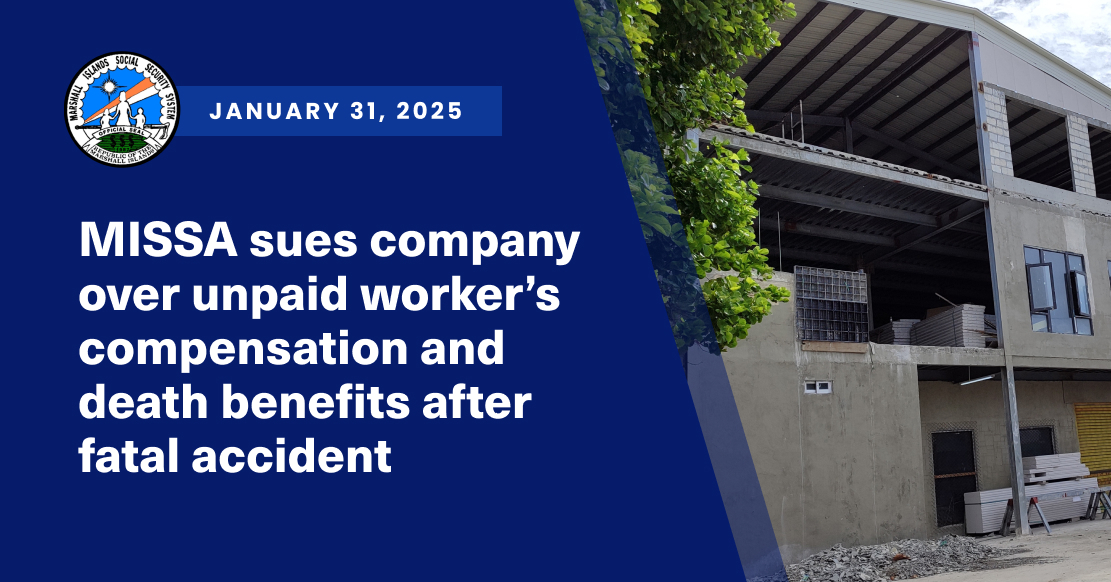Published 31 January 2025
MISSA sues company for refusal to pay worker’s compensation and death benefits for worker involved in fatal accident

On December 11, 2024, a worker of Blue Pacific Enterprises, Inc., was involved in a fatal accident. The victim fell from a building under construction and was immediately taken to Majuro hospital for emergency treatment but died consequently due to serious injuries. This incident warrants immediate payment of worker’s compensation and death benefits, but the employer refused to pay.
About 9 months prior to this incident, MISSA has already sent a First Notice of non-Compliance, dated March 13, 2024, to the subject company, as the principal owners failed to cover their workers with worker’s compensation insurance. The company ignored MISSA’s notice.
On January 3, 2025, about 2 weeks after the victim’s death, MISSA sent another notice of non- compliance, reiterating that the employers have failed to secure worker’s compensation insurance and specifically mentioned the deceased worker as not covered with insurance. In the same notice, MISSA advised that the Administration intends to seek prosecution for civil and criminal penalties for the following violations:
- Failure to secure payment of worker’s compensation which carries a fine of $1,000 or imprisonment of not more than one year, or both; and
- Failure to submit an employer’s report of worker’s injury/death which carries a penalty of $5 per day not to exceed $500.
In response to MISSA’s notice of non-compliance, the principal defendant said, “although the deceased worker’s death was unfortunate and tragic, he was never our employee. To this day, we are still looking for which company he belongs to. Because he passed away in our vicinity does not mean he is employed by our company.” Then again, she reiterated that the deceased worker was never employed by her company.
Based on MISSA’s own investigation, it was discovered that the deceased worker has been seen working for the company as a foreman.
To assist the victim’s family, MISSA, which also administers the Workers’ Compensation Program, is now working hand-in-hand with its Legal Counsel, Divine Waiti, who has already filed the case in court against the employer for failure and refusal to pay worker’s compensation and death benefits to the family of the victim. The Administration has sought the maximum workers’ compensation benefit of $40,000, plus $1,200 in death benefits, and other civil compensation for failure to comply with the Workers Compensation Act.
Under Section 739 of the RMI Workers’ Compensation Act (2019). Penalty for Failure to
Secure Payment of Compensation
(1) Civil Penalty
“The Administrator shall assess against any employer required to secure the payment of compensation under this Chapter who fails to secure such compensation a civil fine of not more than One Hundred Dollars ($100) per day for each day such failure continues.
The defendant’s denial and refusal to pay prompted the Administration to dig deeper into the case. Fortunately, another worker with a kind-heart who has previously worked with the defendant’s company, came forward and voluntarily signed an affidavit under oath, attesting that he knows personally the deceased worker and that he and the latter have worked together in the same building where the accident took place. MISSA also found out that the defendant failed to provide safety construction gears to its workers assigned to that building. This act of negligence will further aggravate and put more weight on the case against them. To build a stronger case, MISSA will continue to look for more witnesses to ensure that the family of the deceased worker will get the maximum financial benefits that they deserve.
This incident will also serve as a wake-up call to employers who continue to disregard the Workers’ Compensation law. If they continue to avoid paying the premium (as low as $250-$300 a year for small business) and a worker under their employ has sustained a serious injury that may require overseas treatment, they stand to pay not only the $40,000 workers’ compensation benefit, but possibly, thousands or millions of dollars in hospitalization costs. There was a case in CNMI where hospitalization costs reached $4 million. Under the RMI Workers’ Compensation Act (2019), there is no limit in hospitalization costs, which may include cost of air ambulance if needed, surgery, rehabilitation, other treatments and diagnostic tests that are necessary until the patient fully recovers. These costs may be charged to a non-compliant employer.
Recent Posts
- MISSA sues company for refusal to pay worker’s compensation and death benefits for worker involved in fatal accident
- Request for Proposals (RFP) For Investment Advisory Services
- MISSA’s Investment Committee to start more proactive oversight of the Retirement Fund
- 6 new MISSA Board members appointed by Cabinet
- Market value of MISSA’s foreign investments up by $10.5M in 2023